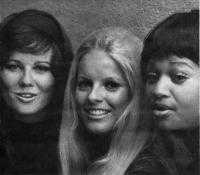With their long tails and ears for hats, the animated trio Josie and the Pussycats represented the cartoon universe's most daring plunge into the realm of rock and roll. Debuting in the early '70s, the Pussycats broke new ground as an all-female group as well as a multi-cultural unit, a vanguard advancement not only within the realm of animation but also in the real world, where pop music remained a largely male and largely white phenomenon. In fact, with their twee popcraft, sassy attitude and cute-as-a-button image, it could be argued that they were the original cuddle-core band. Like the Banana Splits, Josie and the Pussycats were the creation of producers William Hanna and Joseph Barbera, the unquestioned kings of 1960s and '70s Saturday morning television.
The Archies were the Hanna-Barbera team's first television-to-music success story: an animated series based on the long-running comic book about teenager Archie Andrews and the rock band formed with his friends Betty, Veronica, Reggie and Jughead, the program spawned the 1969 smash "Sugar Sugar," a single performed by a group of anonymous New York session players which, when marketed as an Archies record, became the year's biggest hit.
Clearly, the market for other pre-fabricated cartoon bands existed, and soon Josie and the Pussycats was created as an Archies spin-off. However, the series also followed the lead of another Hanna-Barbara hit, The Adventures of Scooby-Doo, a program documenting the exploits of a group of teens and their pet dog as they travelled the country solving mysteries.
For Josie and the Pussycats, Hanna and Barbera tweaked the formula; not only did singer/guitarist Josie McCoy and her gang — drummer Melody Valentine and bassist Valerie Brown (an African-American who shattered barriers as one of Saturday morning's first minority heroines), roadie Alan M. Mayberry, twins Alexander and Alexandra Cabot, and cat Sebastian — journey across the globe (and even into outer space) in search of action ala Scooby-Doo, they also toured steadily as a successful rock band, in the mold of the Archies. (Not coincidentally, Alan was a virtual dead ringer for Scooby-Doo's Freddy, while Alexander's voice was supplied by famed radio DJ Casey Kasem, who also handled vocal duties for Scooby's pal Shaggy.)
Premiering in the fall of 1970, Josie and the Pussycats was an immediate hit; while, unlike the Archies, the group never launched a major record, their success did lead to the release of a 1970 LP on Capitol, with backing vocals provided by a then-unknown Cheryl Ladd (who several years later shot to fame as Farrah Fawcett's replacement on Charlie's Angels).
Additionally, their popularity resulted in a series of virtually identical Hanna-Barbera productions, including The Amazing Chan and the Chan Clan, Butch Cassidy and the Sundance Kids and Jabberaw; when a revamped Josie and the Pussycats in Outer Space premiered in 1972, an animated Partridge Family was even rocketed into orbit as well. The series went off the air in 1973, but remained a cult favorite as well as a major pop influence, particularly on the so-called "cuddle-core" movement of the early '90s; one of the most successful of these new groups, Cub, even went so far as to recruit Archie comics artist Dan DeCarlo to create album artwork clearly modeled on the Pussycats' image. — Jason Ankeny
